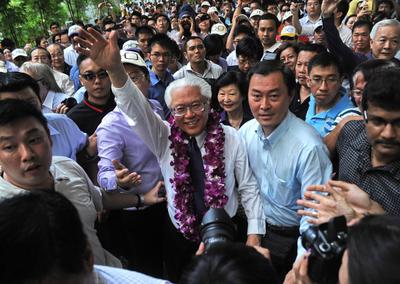Business was Singapore’s business, so the argument went. Hence, a nation of shopkeepers would not rock the stable political scene that made markets function smoothly.
That myth was demolished in last May’s general election. While the PAP was returned to power with a credible 60 per cent of the vote, it lost its first Group Representation Constituency (GRC) and, with it, three ministers, including the very talented Foreign Minister George Yeo. Since GRCs had long been regarded as PAP fortresses, the loss of the Aljunied GRC to the Workers’ Party was symbolically ominous, if nothing else. The opposition had crossed an historical threshold.
Prime Minister Lee Hsien Loong lost no time in addressing the grievances that fuelled the opposition’s success. These involved discontent over the scale of immigration; the access of young, first-time buyers to public housing; crowded public transport; and the high cost of living, particularly when juxtaposed against high ministerial salaries. In a dramatic move, Singapore’s first two prime ministers — Lee Kuan Yew and Goh Chok Tong — both left the cabinet. So did three other ministers associated with unpopular policies in immigration, housing and transport. Ministerial salaries are being reviewed by an independent committee, and policy shifts have been announced in immigration and housing.
The effects of these changes will take time to be felt. In the meanwhile, the presidential election has become a continuing referendum on the PAP’s rule. Reflecting the assertive mood of the populace, the four candidates have participated in an exhaustive debate on the nature of the presidency itself. The key issue is whether the president, being elected directly by the people, can be a check on the government. If so, to what extent can the president intervene in public issues? To what point could the president disagree with government? If such powers were exercisable, should ensuing disagreements be kept private or be made public?
The constitutional position is clear: the elected president has blocking powers in five major areas, but only those five. They are the spending of Singapore’s past reserves, key public service appointments, detentions under the Internal Security Act, restraining orders under the Maintenance of Religious Harmony Act, and investigations carried out by the Corrupt Practices Investigation Bureau. In that sense — but in no other — the presidency is indeed a check on the powers of the executive. Beyond those areas, all public acts and speeches of the president can be carried out only on the advice of the cabinet, and the president cannot reject any advice given by the cabinet.
The four contenders in their campaigns for the presidency have sought to demonstrate how they can articulate public sentiments given these constitutional parameters. Given the intensity of the debate, this election will be a barometer of public opinion and expectations that will leave its imprint on Singaporean politics for years to come.
Coincidentally, all four candidates are ‘Tans’: former Deputy Prime Minister Tony Tan, former Member of Parliament Tan Cheng Bock, former CEO of National Trades Union Congress Income Tan Kin Lian, and former senior civil servant Tan Jee Say. Except for the last, the others were all members of the PAP; Tan Jee Say contested the May election unsuccessfully as a candidate for the opposition Singapore Democratic Party. The order of their names also probably indicates their distance from the PAP government, an important issue that cropped up during the campaign.
It will be a close call. All four are reaching out to different segments of Singapore’s increasingly-polarised electorate. All four have made their positions clear on issues that confront Singaporeans. All four have defended those positions vigorously in a largely decorous campaign.
As Singaporeans cast their ballots, they will have to decide which candidate promises the best combination of stability and change. Whichever way they choose, they take another step away from their reputation of being an apolitical people.
K Kesavapany is the Director of the Institute of Southeast Asian Studies.

